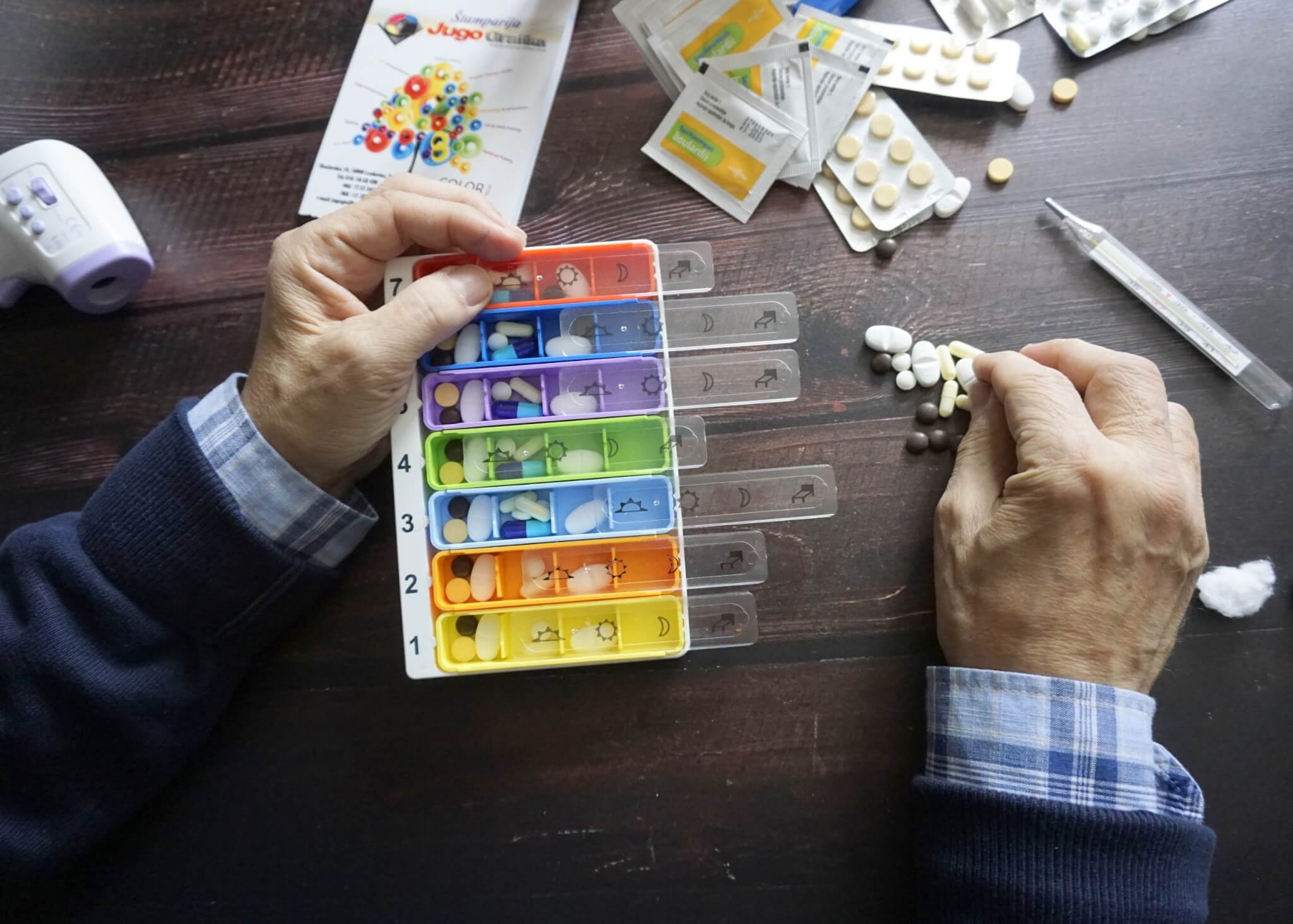Antipsychotic Medication Management
Although there is no cure for schizophrenia and schizoaffective disorder, there are medications that can effectively manage symptoms. Antipsychotic medication is an essential component of treating psychosis.
Download Antipsychotic Medicine Management (PDF)
Antipsychotics
Overview
The first antipsychotics that were developed are now known as “first generation” or “typical” antipsychotics.
More recently developed antipsychotic medications are called “second generation” or “atypical”.
The atypical medications may work better to improve certain symptoms and have fewer side effects.
There is one medication that can be effective for treatment-resistant psychosis, as well as long-acting injectable medications that can help prevent relapses.
How Antipsychotics Work
Antipsychotics typically work by altering the activity of neurotransmitters in the brain, particularly dopamine.
First-generation antipsychotics work by blocking dopamine receptors in the brain. By reducing dopamine activity, they help to alleviate the “positive symptoms” of psychosis, such as hallucinations and delusions.
Examples of first-generation antipsychotics include:
- Haloperidol (Haldol)
- Loxapine (Loxitane, Adasuve)
- Chlorpromazine (Thorazine, Largactil)
- Fluphenazine (Prolixin)
- Perphenazine (Trilafon)
- Trifluoperazine (Stelazine)
- Flupenthixol (Fluanxol, Depixol)
- Thiothixene (Navane)
- Zuclopenthixol (Cisordinol, Clopixol)
Atypical antipsychotics affect both dopamine and serotonin receptors. This can address both positive symptoms and may help improve “negative symptoms” (e.g., apathy, social withdrawal) associated with psychotic disorders.
Examples of atypical antipsychotics include:
- Aripiprazole (Abilify)
- Asenapine (Saphris)
- Cariprazine (Vraylar)
- Clozapine (Clozaril)
- Lurasidone (Latuda)
- Olanzapine (Zyprexa)
- Paliperidone (Invega)
- Quetiapine (Seroquel)
- Risperidone (Risperdal, Consta)
- Ziprasidone (Zeldox)
How to Take Antipsychotics
Antipsychotics are available as oral medications or long acting injectables.
Oral medications are available as tablets or liquids and need to be taken daily.
Long-acting injectable medications are injected into a muscle and release the medication slowly over weeks or months.
This eliminates the need for patients to take medication every day, which can improve medication adherence, provide a consistent level of medication in the body, and for some patients prevent relapse more effectively than oral medications.
Examples of antipsychotics that are available in Canada as long acting injectables include:
- Abilify Mantenna (aripiprazole monohydrate)
- Aristada (aripiprazole lauroxil)
- Invega Sustenna
- Invega Sustenna or Xeplion (paliperidone palmitate)
- Invega Trinza (paliperidone palmitate)
- Risperdal Consta (risperidone microspheres)
Side Effects of Antipsychotics
While effective, antipsychotic medications can have a range of side effects. These can vary depending on the specific drug, dosage, and individual patient.
There can be initial side effects while a person adjusts to the medication, ongoing side effects that persist with use, and side effects that develop after long-term use.
The most common side effects for both first-generation and atypical antipsychotics include:
- sedation/drowsiness
- dizziness
- dry mouth
- constipation
- blurred vision
- weight gain
First-generation antipsychotic medications can cause extrapyramidal symptoms (EPS), which are motor-related side effects and can include:
- akinesia (slowed movement)
- akathisia (inner restlessness, inability to stay still)
- dystonia (involuntary muscle contractions, often causing abnormal postures)
- parkinsonism (tremor, rigidity, slow movement)
- tardive dyskinesia (involuntary, repetitive movements, often of the face, tongue, and limbs)
Atypical antipsychotics tend to have fewer neurological side effects, but may have other side effects, such as:
- metabolic syndrome: increased risk of weight gain, high blood sugar (diabetes), elevated cholesterol, and high blood pressure
- Q-T Prolongation: some atypical antipsychotics can affect heart rhythm, requiring ECG monitoring in certain patients
Treatment-Resistant Psychosis
Although there are many effective antipsychotic medications, some people with schizophrenia do not respond to standard treatments.
Patients who have not responded well to trials of at least two antipsychotic medications are considered to have treatment-resistant psychosis.
Around 30% of people with psychosis experience treatment-resistant psychosis.
The most effective treatment for people who do not respond to other medications is an atypical antipsychotic medication called clozapine.
About one-third of patients with treatment-resistant schizophrenia who have not responded to other medications show at least some improvement on clozapine.
Despite its efficacy, clozapine has more challenging side effects that require strict monitoring.
The major drawback of clozapine is the very slight risk (1%) that it will cause white blood cells to decrease, which reduces a person’s resistance to infection.
Because of this risk, people taking clozapine must have their blood count monitored regularly.
Starting Treatment
It is critical to start treatment as soon as possible after symptoms of psychosis develop.
Individuals who receive early treatment for their first psychotic episode tend to respond more quickly and effectively to antipsychotic medications.
This can help reduce both positive and negative symptoms, improve functioning, and support recovery.
The choice of medication depends on the individual’s symptoms, response to treatment, side effect profile, and co-occurring conditions.
Doses are typically started low and gradually increased to find the optimal therapeutic effect with minimal side effects.
People may need to try several medications or different doses to find what works best for them.
Medication needs can also change over time and a medication that works today could lose its effectiveness in the future.
Adjusting Treatment
It is important to work with a psychiatrist or physician to ensure that a medication, its effectiveness, and any side effects are being assessed regularly and adjusted if needed.
Regular medical monitoring, including physical examinations, blood tests, and metabolic screenings, is essential to manage potential side effects.
If a medication is not effective or if side effects are persistent and problematic, the doctor may recommend changing the dose or trying a different medication.
The most common reasons for switching antipsychotic medications include:
- persistent positive symptoms (hallucinations, delusions, etc.) despite taking medication regularly
- persistent negative symptoms (blunted emotions, social withdrawal, etc.) despite taking medication regularly
- severe discomfort from side effects and little or no relief from the usual side effect medications
Abruptly stopping antipsychotic medication can lead to withdrawal symptoms and an increased risk of relapse.
Any changes to medication should be made under the guidance of a healthcare professional.
Treatment Adherence
It is critical to take antipsychotic medication as prescribed.
Abruptly stopping or inconsistently taking antipsychotic medication is the strongest predictor of psychotic relapse.
Over 80% of individuals with schizophrenia will experience a relapse of symptoms within one year of discontinuing medication. This can happen within a few weeks or months.
Relapses can lead to repeated hospitalizations, poorer functioning, substance use, and self-harm.
People may struggle to take their medications as directed for a number of reasons:
- Cognitive impairments that impact memory and organizational skills can make it difficult to take medication consistently.
- Severe and persistent side effects can make it difficult for people to continue taking their medications.
- Substance use can also interfere with adherence and make symptoms worse.
- Patients who use cannabis are significantly more likely to miss doses or discontinue their medication, leading to poorer treatment outcomes.
- Cannabis use can also reduce the effectiveness of certain antipsychotic medications. This increases the risk of relapse, even in patients who are otherwise compliant with their antipsychotic medication.
Supporting Treatments
Medication is critical for treating schizophrenia and psychosis symptoms, but it is also important to incorporate other forms of treatment to ensure the best outcomes, such as:
- psychotherapy: cognitive behavioural therapy can help people manage symptoms, challenge delusional beliefs, and develop coping strategies
- psychosocial rehabilitation: programs focused on improving social skills, vocational training, and independent living can significantly enhance functional outcomes and quality of life
- family psychoeducation: educating families about the illness and how to support their loved ones can improve adherence and reduce family burden
- supportive therapy: providing a safe and empathetic space for individuals to discuss their experiences and challenges can support treatment and recovery
Consult Your Doctor
It is important to consult with a doctor and pharmacist about antipsychotic medications, their side effects and to discuss how they interact with other medications or conditions.






